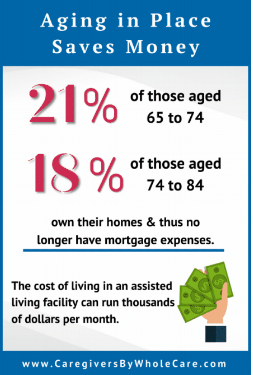For most of our nation’s seniors, the thought of needing to move into a nursing home or assisted living facility is an unpleasant one. Who can blame them? The comfort and familiarity of home allows them the independence to decide for themselves when to fall asleep, what they want to eat, and the activities they wish to engage in. Thankfully, aging at home is a viable option for many seniors due to the variety of available home care services. Below are four different types of care and support that can be provided right in a senior’s home.
 Four Types of Support That Allow Seniors to Age at Home
Four Types of Support That Allow Seniors to Age at Home
1. Private Duty In-Home Care Services: Private duty home care is non-medical care that can include such types of assistance as companionship, house cleaning and meal preparation, transportation and errand-running, personal care, specialized dementia care, and more. Private duty in-home care is typically paid for by the senior or their family members. Some services may be covered by long-term care insurance, workers’ compensation, or veterans’ benefits.
2. Home Health: Home health care includes skilled nursing assistance, typically following an injury but also for chronic conditions. Services offered include diabetes care, wound care, injections, blood pressure monitoring, and other treatments that require nursing skills. Home health care can also encompass services such as physical therapy, occupational therapy, and speech therapy. Some home health care needs may be coveredthrough Medicare when specific conditions are met.
3. Geriatric Care Management: Geriatric care managers (or Aging Life Care Specialists) assist with handling the details of a senior’s life and estate that are not covered by direct care providers, such as the management of finances. Geriatric Care Managers also coordinate other care services for seniors, such as mediating family communications, providing assistance with changing living arrangements, or closing up a household. This type of support is almost always an out-of-pocket expense.
4. Hospice: Hospice care is available in the home when patients are nearing the end of a terminal illness. It provides comfort and support for both the senior and their family. Hospice offers a full range of services that can include nursing, emotional health, and spiritual needs. Hospice care is usually covered by most private insurance providers and through Medicare when the appropriate requirements are met.
Will one or more of these support options allow your senior loved one to age safely at home?
We meet with families every week – free of charge – to help them navigate these care and support questions. Your needs may be short or long-term. For example, you may be looking for an added level of safety and companionship, or you may have specialized care needs. Whatever the case, we have the experience needed to create a plan of care tailored to your unique needs. Call us anytime at 615-422-7549 to arrange for a free in-home consultation to learn more. Visit caregiversbywholecare.com for more information.


















